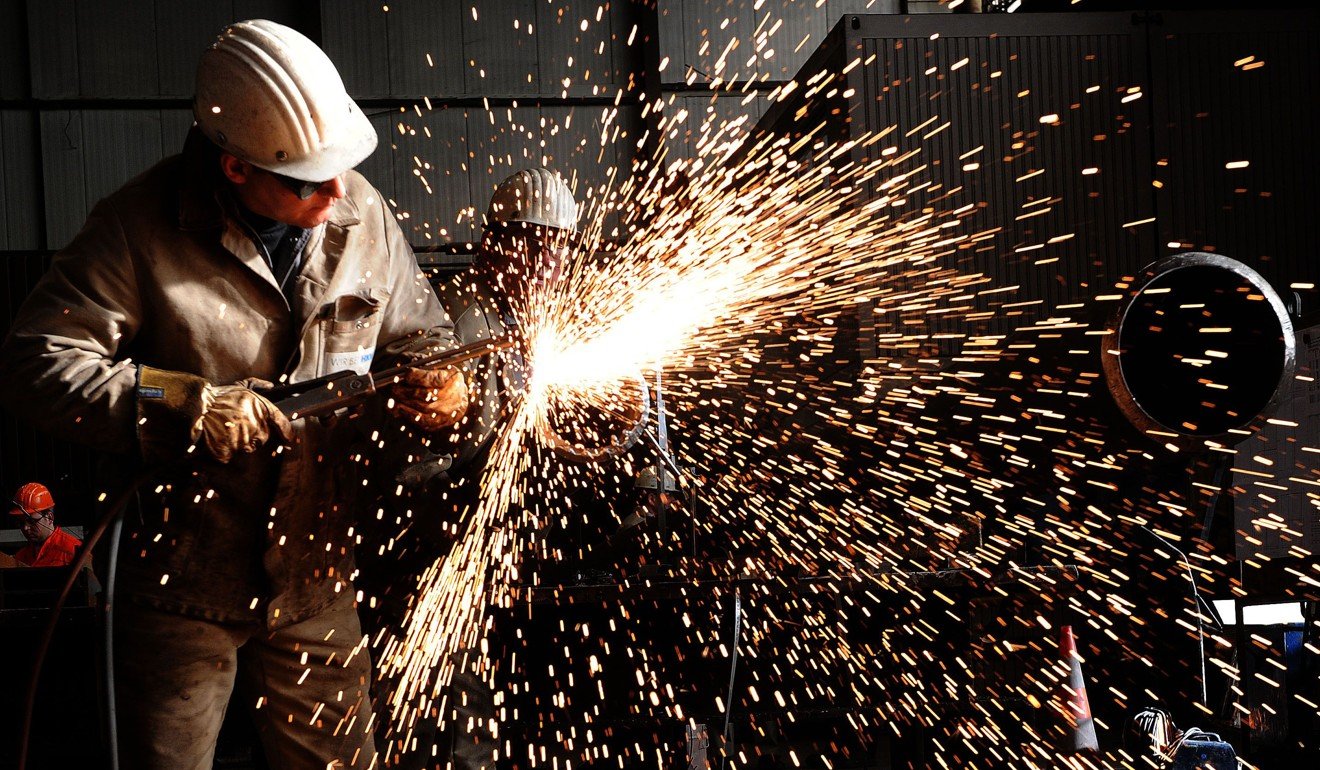
Analysis | Merkel’s fourth term hinges on Germany’s changing rust belt, and left-wing party members who will decide her fate
Social Democrats will now vote on whether to accept a grand coalition deal to be junior partners to Merkel’s conservatives – but persuading them in a transformed industrial heartland may be a tall order
They’re hiring in Duisburg, an old German industrial city that boasts the world’s biggest inland port.
These days, those vacancies increasingly mean jobs for software professionals, not stevedores or steel workers, the working-class aristocracy that once reigned along the banks of the Ruhr. That digital shift is rippling through to politics and Chancellor Angela Merkel’s bid to stay in power.
In addition to lower wages, about 40 per cent of the jobs require academic or professional qualifications and are generally out of reach for old-line workers. Where mammoth steel plants once dominated, the booming industry involves networking barges, trains and trucks.

Today’s workers are no longer all working in factories and go to union meetings. They are working at home from their desktops. Our traditional means are not fit to reach them
The changing nature of work is roiling the Social Democrats, Germany’s oldest party and the dominant force in the city’s left-leaning politics since second world war. As the SPD struggles to connect with a new generation of workers, its electoral demise is stoking a crisis over the party’s direction that risks halting Conservative Merkel’s next government before it begins.
After a hung election and a hard-won coalition deal forged with Merkel’s Christian Democratic Union on Wednesday, a ballot by the SPD’s more than 460,000 members will now decide whether she can extend her 12 years in office. The big unknown is whether SPD leaders backing the pact can persuade enough members, especially young activists, to support another stint as the conservative titan’s junior coalition partner.
“It’s difficult to reach the digital generation,” said Baerbel Bas, an SPD lawmaker who represents a Duisburg district in the Bundestag, or national parliament. “Today’s workers are no longer all working in factories and go to union meetings. They are working at home from their desktops. Our traditional means are not fit to reach them.”
North Rhine-Westphalia, where Duisburg is located, has outsize influence, accounting for almost a quarter of SPD members. It’s also a symbol of the party’s decline: voter support has dwindled from more than 60 per cent in its heyday to 31 per cent in last year’s state election.

The harbour has expanded massively, making use of its rail and highway links and spurring the creation of about 30,000 logistics jobs in the area since 2000. But not all of these are suitable for former steel labourers.
Reminders of Duisburg’s past are everywhere: a former mega disco sits abandoned, staff parking lots are choked with weeds, while a decrepit supply tunnel prepares to be filled with sand to save it from collapse.
In the north, ThyssenKrupp’s Bruckhausen steel plant is still hanging on, with its hulking towers and sprawl of ageing pipes – big enough to walk through – looming over the streetscape. But the days of monolithic steel and coal facilities, staffed by thousands of workers with common needs and interests, are fading. In their place are disparate groups of IT specialists, software programmers and electronics experts.

Despite the loss of big employers, Duisburg is making strides to create new jobs. The push has included realigning the Tectrum technology centre after a disjointed effort left about 40 per cent of the three-building complex standing empty. Now, the centre boasts innovative young companies like imaging-technology provider Helion Vision, wave-energy specialist Nemos and Mifitto, which matches a person’s foot shape to the appropriate shoes. There’s a waiting list for space, and discussions are under way to expand the facility.
The green shoots don’t ease the SPD’s political conundrum, as it seeks messages that appeal to its traditional union base as well as Germany’s knowledge workers. It’s an uphill struggle as far-right parties across Europe pull in voters who used to lean left.
The trend played out in the German election in September: the anti-immigration Alternative for Germany more than doubled its support in Bas’s Duisburg district, while the SPD lost a fifth of its voters. Joining Merkel in another “grand coalition” of the two biggest parties isn’t necessarily a selling point for the Social Democrats.
“With the digitalisation of the economy, labour structures will get ever smaller,” said Andreas Ocklenburg, managing director of CloudSME, a six-person Duisburg start-up that provides high-performance computing capacity as a service. “The grand coalition is a snoozefest.”

